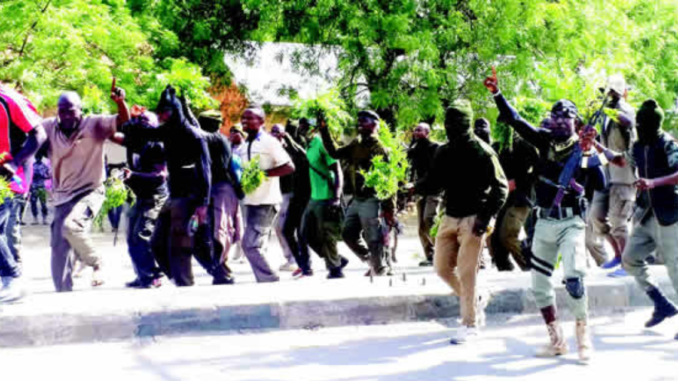
POLICEMEN on emergency duty in Maiduguri grabbed the headlines recently with their protest against six months unpaid allowances by the authorities. The action jolted the city’s residents, who are already weary of constant commotion instigated by the intractable Boko Haram insurgency in the North-East region. The anomaly is yet another low mark for the tenure of the Inspector-General of Police, Ibrahim Idris.
The protesters blocked the major highway in the city, fired gunshots sporadically in the air as they gyrated towards the police headquarters in the Borno State capital to register their anger. Some of them did not disguise their identities when they threw salvos at the IG. It is worrisome that the welfare of the cops is being trifled with, given the special nature of their assignment – maintenance of law and order. About 10,000 mobile policemen from different states were deployed in Maiduguri to join the military in maintaining law and order. The area has been convulsed by Boko Haram terrorism since 2009.
Obviously embarrassed by this turn of events, the police headquarters, as usual, denied that the protest happened. Its spokesman, Jimoh Moshood, in a swift reaction, said, “Some of them went to the Borno State Police Command Headquarters on enquiry over the delay in the payment of their special duty…and not on protest as reported in some media.” Not many would be surprised by this official howler, given the sophistry that defines police public relations, especially when they goof. The picture of the protesters clutching their rifles and leaf branches, captured on the front pages of newspapers, gives the lie to the police defence.
But this was not the first time welfare concerns would cause policemen to spill into the street. It happened in 2002 and claimed the scalp of the then IG, Musiliu Smith, who was retired. Also, eight state police commands comprising Bayelsa, Ekiti, Gombe, Kaduna, Kebbi, Imo, Nasarawa and Ogun in 2017 protested the non-payment of their salaries and allowances. Attempts have been made to link the present protest to the National Assembly’s delay in passing the 2018 budget, which the President signed into law last month. But nothing could be further from the truth. Clearly, it is a case of dereliction of responsibility by the police authorities.
Every budget captures their financial requirements. If shortfall existed, funds could have been sourced from Service Wide Vote – a special provision in the budget to take care of emergencies in Ministries, Departments and Agencies. Besides, the President has the power to spend money in running the affairs of the country up to six months, pending the passage of the budget as expressly stated in Section 82 of the 1999 Constitution.
The House of Representatives, which launched an investigation into this crisis last week, was spot-on, therefore, when it said the protest was capable of leading to anarchy in the already troubled territory. President Muhammadu Buhari, too should be concerned and embarrassed. He should demand explanations from the IG, and ensure that those whose errors of omission or commission led to these shortcomings are punished. Given the fact that policemen are poorly paid, and some are ethically vacuous, leaving them to feel deprived when on emergency duty is an invitation to them to compromise the very essence of their mission there, and the primary purpose of government: protection of lives and property.
The fight against Boko Haram has endured for almost a decade. Therefore, Nigeria ought to have acquired some degree of capacity in emergency management, which includes the welfare of security personnel. Many internally displaced persons are still scared stiff of returning to their villages with the lack of security personnel presence there. They should not be made scarier by not clearing this mess or repeating this folly. Out of an estimated 1.6 million IDPs in the North-East, according to the International Organisation of Migration, as of April 2017, 84 per cent are in Borno State.
This should be the last time policemen in the country would have cause to behave like trade unionists. Its deleterious effect on lives and property is why the Trade Union Act prohibits the Nigeria Police Force; Army; Navy and Air Force from forming unions or being involved in trade unionism. The police should not continue to take a back seat in the handling of welfare of the armed services. For instance, when the Ombatse cult killed 74 police and State Security Service personnel in Nasarawa State in 2013, the police paid only N2 million each to the families of the victims, (N1 million from the state government), while the SSS doled out N10 million each, to the dependents of its slain agents.
Apparently, police personnel deployed in Borno, Adamawa and Yobe states are not in any way different from the United Nations peacekeepers, in terms of the challenges they face in their areas of operation. In fact, theirs are even worse with the ease police stations are stormed and policemen killed by Boko Haram. For help, the UN guidelines on the welfare of peacekeepers will come in handy. The document states, “Meeting minimum welfare is critical.” A police chief of staff is created, which ensures the provision of the mission’s specific welfare policies, just as a contingent commander monitors implementation.
Indeed, at a time the Islamists are renewing their energy in the North-East region, aimed at regaining lost territories, our law enforcement agencies deserve the highest motivation, not a damper in any form from the authorities.
END

Be the first to comment